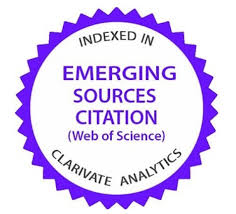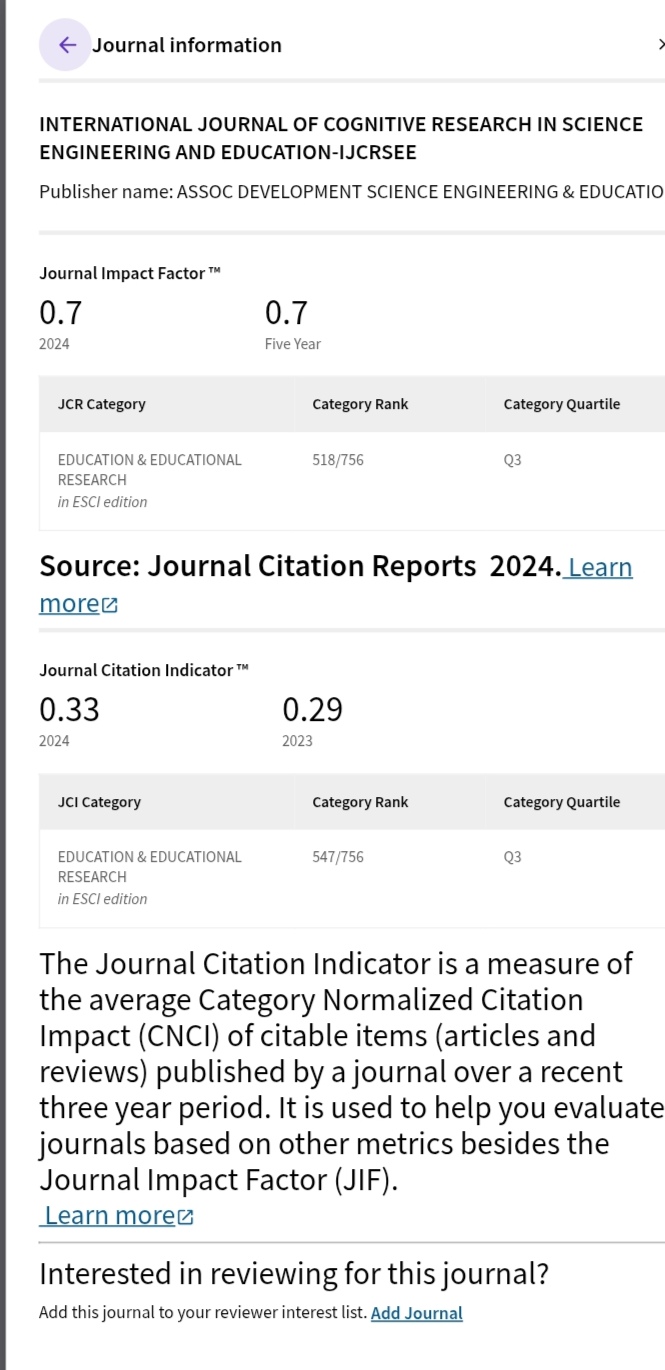THE TEACHER’S ROLE AND PROFESSIONAL DEVELOPMENT
DOI:
https://doi.org/10.5937/ijcrsee1802033MKeywords:
teacher’s professional identity, professional development of teachers, expectations, beliefsAbstract
The text addresses the theme of teachers’ professional development. The role of a teacher is defined by cultural and social events and the environment, and they influence the differences that occur in the concept of teacher roles within different cultures, societies, including the geographic environment. Thus, in the first part of the paper, based on an analysis of the literature, we identify factors that significantly influence teachers’ perception of their role and consequently, determine their professional identity. In the second part, based on the results of the empirical research, we show that factors such as teachers’ beliefs about their own qualifications, as well as years of work experience and subject area, statistically significantly influenced the development of the teachers’ professional identity. The main findings of the study are that teachers with several years of service experience feel better qualified to perform their duties (tasks related to planning and teaching were rated the most highly) than teachers with less work experience, and that teachers with more work experience evaluated the claims related to their educational activity statistically significantly higher. An important finding is that teachers define their professional identity and consequently, their role through their personality traits, which shows that we must not ignore teachers’ personality traits, as they play an important role in teachers’ professional development and identity.
Downloads
References
Adams, S. R. (1970). Analysing the teacher’s role. Educational Research, 12(2), 121–127. https://doi.org/10.1080/0013188700120205
Arnon, S. & Reichel, N. (2007). Who is the ideal teacher? Am I? Similarity and difference in perception of students of education regarding the qualities of a good teacher and of their own qualities as teachers. Teachers and Teaching: theory and practice, 13(5), 441-464. https://doi.org/10.1080/13540600701561653
Beijaard, D. (1995). Teachers’ Prior Experiences and Actual Perceptions of Professional Identity. Teachers and Teaching: Theory and Practice, 1(2), 281–294. https://doi.org/10.1080/1354060950010209
Beijaard, D., Meijer, P. C., & Verloop, N. (2004). Reconsidering research on teachers’ professional identity. Teaching and Teacher Education, 20(2), 107–128. https://doi.org/10.1016/j.tate.2003.07.001
Beijaard, D., Verloop, N, & Vermunt, J. D. (2000). Teachers’ perceptions of professional identity: an exploratory study from a personal knowledge perspective. Teaching and Teacher Education, 16(7), 749–764. https://doi.org/10.1016/S0742-051X(00)00023-8
Ben-Peretz, M., Mendelsona, N., & Kronb, F. W. (2003). How teachers in different educational contexts view their roles. Teaching and Teacher Education, 19(2), 277–290. https://doi.org/10.1016/S0742-051X(02)00100-2
Buchberger, F., Campos, B. P., Kallos, D., & Stephenson J. (Eds.) (2000). Green Paper on Teacher Education in Europe: High Quality Teacher Education for High Quality Education and Training. Thematic Network on Teacher Education in Europe, Fakultetsnämnden för lärarutbildning,Umea universitet. https://repositorio-aberto.up.pt/bitstream/10216/56472/2/14487.pdf
Calderhead, J., & Robson, M. (1991). Images of teaching: Student teachers’ early conceptions of classroom practice. Teaching & Teacher Education, 7(1), 1–8. https://doi.org/10.1016/0742-051X(91)90053-R
Day, C., Kington, A., Stobart, G., & Sammons, P. (2006). The personal and professional selves of teachers: stable and unstable identities. British Educational Research Journal, 32(4), 601–616. https://doi.org/10.1080/01411920600775316
Fullan, M. (1993). Change forces. Probing the Depths of Educational Reform. London: The Falmer Press. http://files.hbe.com.au/samplepages/CO2639.pdf
Fullan, M. and Hargreaves, A. (2000). Za kaj se je vredno boriti v naši šoli? [What’s worth fighting for in our school?]. Ljubljana: Zavod Republike Slovenije za šolstvo.
Gjedia, R., & Gardinier, M. P. (2018). Mentoring and teachers’ professional development in Albania. European Journal of Education, 53(1), 102-117. https://doi.org/10.1111/ejed.12258
Goodson, I. F., & Cole, A. L. (1994). Exploring the teacher’s professional knowledge: Constructing identity and community. Teacher Education Quarterly, 21(1), 85–105. https://www.jstor.org/stable/23475536
Huberman, M. (1992). Teacher development and instructional mastery. In: A. Hargreaves & M. G. Fullan (ed.) Understand Teacher Development (pp. 122–142). New York: Teachers College Press.
Kagan, M. D. (1992). Professional Growth Among Preservice and Beginning Teachers. Review of Educational Research, 62(2), 129–169. https://doi.org/10.3102/00346543062002129
Kalin, J. (2006). Učitelji (bodočih) učiteljev na Filozofski fakulteti v partnerstvu s šolami [Teaching (future) teachers at the Faculty of Arts in partnership with schools]. In: C. Peklaj (ed). Teorija in praksa v izobraževanju učiteljev [Theory and practice in teacher education] (pp. 173–182). Ljubljana: Center za pedagoško izobraževanje Filozofske fakultete Univerze v Ljubljani.
Katalog programov nadaljnjega izobraževanja in usposabljanja strokovnih delavcev v vzgoji in izobraževanju za šolsko leto 2016/2017 [Catalogue of further education and training of professional workers in education for the school year 2016/2017]. (2016). Ljubljana: Ministrstvo za izobraževanje, znanost in šport. Retrieved from: https://lim3.mss.edus.si/katis/Katalogi/KATALOG1617.pdf
Korthagen, F. A. J. (2004). In search of the essence of a good teacher: towards a more holistic approach in teacher education. Teaching and Teacher Education, 20(1), 77–97. https://doi.org/10.1016/j.tate.2003.10.002
Kovač Šebart, M. (2002). Samopodobe šole: konceptualizacija devetletke [Self-image of the school: Conceptualization of the nine year school]. Ljubljana: Zavod Republike Slovenije za šolstvo: Znanstveni inštitut Filozofske fakultete.
Kunst, E. M., van Woerkom, M., & Poell, R. F. (2018). Teachers’ goal orientation profiles and participation in professional development activities. Vocations and Learning, 11(1), 91-111. https://doi.org/10.1007/s12186-017-9182-y
Lachner, A., Jarodzka, H., & Nückles, M. (2016). What makes an expert teacher? Investigating teachers’ professional vision and discourse abilities. Instructional Science 44(3), 197–203. https://doi.org/10.1007/s11251-016-9376-y
Makovec Radovan, D. (2017). Pojmovanja vloge učitelja v procesih načrtovanja in izvajanja pouka v srednješolskem izobraževanju. Doctoral dissertation. [Conception of the role of the teacher in the process of planning and conducting instruction in secondary education. PhD Dissertation]. Univerza v Ljubljani, Filozofska fakulteta, Oddelek za pedagogiko in andragogiko.
Marentič Požarnik, B. (2006). Okvirni seznam ključnih kompetenc/zmožnosti [Indicative list of key competences]. In: XV Strokovno srečanje ravnateljic in ravnateljev. Osnovno šolstvo. [XV Expert Meeting of primary school principals]. Ljubljana: Ministrstvo za šolstvo in šport.
McRobbie, C.J., & Tobin, K. (1995). Restraints to reform: the congruence of teacher and student actions in a chemistry classroom. Journal of Research in Science Education, 32(4), 373–385. https://doi.org/10.1002/tea.3660320406
Muršak, J., Javrh, P., & Kalin, J. (2011). Poklicni razvoj učiteljev [Professional development of teachers]. Ljubljana: Znanstvena založba Filozofske fakultete.
Nias, J. (1989). Teaching and the self. In: M. L. Holly & C. S. McLoughlin (Eds.), Perspective on teacher professional development (pp. 151–171). London: Falmer Press.
Pajak, E. and Blase, J. J. (1989). The Impact of Teachers’ Personal Lives on Professional Role Enactment: A Qualitative Analysis. American Educational Research Journal Summer, 26(2), 283-310. https://doi.org/10.3102/00028312026002283
Pajares, M. F. (1992). Teachers’ Beliefs and Educational Research: Cleaning Up a Messy Construct. Review of Educational Research, 62(3), 307–332. https://doi.org/10.3102/00346543062003307
Podgornik, V., & Vogrinc, J. (2017). The role of headteachers, teachers, and school counsellors in the system of quality assessment and assurance of school work. SAGE Open, 7(2), 1–13. https://doi.org/10.1177/2158244017713239
Poom-Valickis, K., Oder, T., & Lepik, M. (2012). Teachers’ Beliefs Regarding their Professional Role: a Gardener, Lighthouse or Circus Director? Procedia - Social and Behavioral Sciences, 69, 233–241. https://doi.org/10.1016/j.sbspro.2012.11.404
Radovan, M. (2011). The relation between distance students’ motivation, their use of learning strategies, and academic success. Turkish Online Journal of Educational Technology, 10(1), 216–222. https://files.eric.ed.gov/fulltext/EJ926571.pdf
Radovan, M., & Kristl, N. (2017). Acceptance of technology and its impact on teacher’s activities in virtual classroom: integrating UTAUT and CoI into a combined model. Turkish online journal of educational technology, 16(3), 11–22. http://www.tojet.net/volumes/v16i3.pdf#page=21
Razdevšek Pučko, C. and Rugelj, J. (2006). Kompetence v izobraževanju učiteljev [Competences in teacher education]. V: Tancig, S. in Devjak, T. (ed.), Prispevki k posodobitvi pedagoških študijskih programov [Contributions to the modernisation of pedagogical study programme]. Ljubljana, Pedagoška fakulteta, 30–44.
Rodrigues, L. D. A. D., de Pietri, E., Sanchez, H. S., & Kuchah, K. (2018). The role of experienced teachers in the development of pre-service language teachers’ professional identity: Revisiting school memories and constructing future teacher selves. International Journal of Educational Research, 88, 146-155. https://doi.org/10.1016/j.ijer.2018.02.002
Samuel, M., & Stephens, D. (2000). Critical dialogues with self: Developing teacher identities and roles—a case study of South Africa. International Journal of Educational Research, 33(5), 475–491. https://doi.org/10.1016/S0883-0355(00)00030-6
Šteh, B., & Kalin, J. (2006). Pogledi diplomantov in študentov Filozofske fakultete na načine dela pri predmetih pedagoškega usposabljanja [The views of graduates and students of the Faculty of Arts in ways of working in the subjects of pedagogical training]. In: C. Peklaj (Ed.). Teorija in praksa v izobraževanju učiteljev [Theory and practice in teacher education] (79–90). Ljubljana: Center za pedagoško izobraževanje pedagoške fakultete Univerze v Ljubljani.
Tobin, K., & LaMaster, S. (1995). Relationships between metaphors, beliefs and actions in a context of science curriculum change. Journal of Research in Science Teaching, 32(3), 225–242. https://doi.org/10.1002/tea.3660320304
Valenčič Zuljan, M. (1999). Kognitivni model poklicnega razvoja študentov razrednega pouka. Doktorska disertacija [Cognitive model of professional development of students of class instruction study programme. PhD Dissertation]. Univerza v Ljubljani, Filozofska fakulteta, Oddelek za pedagogiko.
Valenčič Zuljan, M. (2001). Modeli in načela učiteljevega profesionalnega razvoja [Models and principles of the teacher’s professional development]. Sodobna pedagogika, 52(2), 122–141.
Volkmann, M. J., & Anderson, M. A. (1998). Creating professional identity: Dilemmas and metaphors of a first-year chemistry teacher. Science Education, 82(3), 293–310. https://doi.org/10.1002/(SICI)1098-237X(199806)82:3<293::AID-SCE1>3.0.CO;2-7
Yung, B. H. W. (2001). Examiner, Policeman or Students’ Companion: teachers’ perceptions of their role in an assessment reform. Educational Review, 53(3), 251–260. https://doi.org/10.1080/00131910120085856
Zlatković, B. Stojiljković, S., Djigić, G., & Todorović, J. (2012). Self-concept and teachers professional roles. Procedia - Social and Behavioral Sciences, 69, 377–384. https://doi.org/10.1016/j.sbspro.2012.11.423
Published
How to Cite
Issue
Section
License
Copyright (c) 2018

This work is licensed under a Creative Commons Attribution-NonCommercial-NoDerivatives 4.0 International License.











